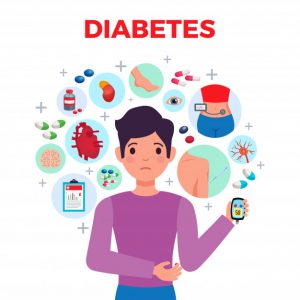How to live a long and healthy life by taking care of yourself proactively.
Diabetes: it is slow, silent and stealthy. It can come on progressively and affect almost every part of your body. It can be perilous, precisely because it is so gradual and we are often so unaware of the symptoms. With meticulous management, however, one can live well and live healthy. So, if you have been diagnosed with diabetes, you will need to be proactive about managing your blood glucose levels, your blood pressure, your cholesterol and your life in general, with healthy diet, exercise, habits and the right treatment. The best way is to seek help, so that along with your doctor you can create the right diabetes self-care plan to manage your diabetes.
THE FOUR STEPS
Here’s a blueprint of the steps you need to include in your diabetes care plan. Consult your doctor and create a diabetes care log book, to track how you are taking care of your diabetes:
- Know your diabetes, because you need to know the ways to manage your diabetes
- Mind the ABCs of your diabetes, because you don’t want your numbers to get out of control
- Learn how to live with diabetes, because without proper lifestyle changes the consequences will be dire
- Get routine care to stay healthy, because without your healthcare team the problems and complications, if any, cannot be taken care of early.
KNOW YOUR DIABETES
You can’t combat an enemy without knowing thoroughly about it. So the first step in managing your diabetes is to know all about it. Read about diabetes online. Ask your doctor for diabetes literature. Join a support group, in-person or online, to get peer support with managing your diabetes. Do take a look at our section on What Is Diabetes for regular updates).
Diabetes is serious disease, although it is often underestimated. You need to make healthy food choices every day, maintain a healthy weight, stay physically active and take your medicines without fail. If you do, your energy level will rise, you will be less tired and thirsty, you will not need to pass urine frequently, you will have fewer infections and heal better. Your chances of having heart attack or stroke, eye problems, nerve and kidney damage, teeth and gum problems, will come down. Talk to your doctor about it.
THE BOTTOMLINE
You have to take diabetes seriously. You have to make a persistent effort to reach and stay within the recommended targets for blood glucose levels suggested by your doctor. The ‘normal’ range of blood glucose is considered to be: 80 to 130 mg/dL before a meal and less than 180 mg/dL about 2 hours after a meal starts. Your doctor will let you know about the best target range for you.
Be sure to achieve the recommended range and tell your doctor if your glucose levels often go above or below the target. To become really proactive, go for self-testing your blood sugar, especially if you take insulin, because glucose levels fluctuate through the day. Instead of a few tests a year at the doctor’s clinic, you can go for daily or weekly self-monitoring your blood sugar at home. Blood glucose meters are easily available and increasingly popular. It can give you an accurate portrayal of your condition at a particular point in time.
MIND THE ABCD

The ABCD help you to manage your A1C (glycated haemoglobin or 3 month index of blood glucose control) blood pressure, and cholesterol. The little “s” also has a meaning: stop smoking. Ask your doctor what your numbers should be.
A for the A1C test
Or HbA1C blood test, is used to measure the average blood sugar levels over the last three months. It helps your doctor see how well your blood glucose level has been controlled on an average and over a time-span. The A1C goal for many people with diabetes is below 7 per cent. Ask your doctor what your goal should be.
B for Blood Pressure
The blood pressure goal should be 140/90 mm Hg for most people with diabetes below age 80 years. For those below age 80, the threshold should be 150/90 mm Hg. Your doctor will let you know what your blood pressure goal should be.
C for Cholesterol
You have two kinds of cholesterol in your blood: LDL or “bad” cholesterol and HDL or “good” cholesterol. Too much LDL can clog your blood vessels and cause a heart attack or stroke. HDL helps remove the “bad” LDL from your blood vessels, but too much of any cholesterol may be bad for your health.
D stands for Discipline which includes Diet, Exercise, Yoga and stop Smoking.
Smoking is particularly bad for people with diabetes. Both smoking and diabetes narrow blood vessels that makes your heart work harder. If you quit smoking, you will lower your risk for heart attack, stroke and all other complications linked to diabetes. Your blood circulation, cholesterol and blood pressure levels will improve. Using tobacco products is equally harmful. Ask for help so you don’t have to do it alone.
Keeping your A1C, blood pressure, and cholesterol levels close to your goals and following diet expert and smoking cessation can help prevent the long-term harmful effects of diabetes: from heart disease, stroke, kidney disease, nerve damage, and eye disease. Keep track of your ABCs, write those down systematically and take those with you when you visit your doctor. Discuss with your doctor about your goals, how you are doing and if you need to make any changes.
LEARN HOW TO LIVE WITH DIABETES
Choose fruits and vegetables, beans, whole grains, fish and lean meats, low-fat milk and cheese, depending on what you are—vegetarian, non-vegetarian or vegan. Drink water instead of sugar-sweetened beverages. Choose foods that are lower in calories, saturated fat, trans fat, sugar, and salt. Make physical activity part of your daily routine. Try to be more physically active. Brisk walking is a good way to move more.
If you are overweight or obese, work with your doctor to create a weight-loss plan that is right for you.
You have to make medicines a part of your life, even when you are feeling good and even if you have reached the goals set by your doctor. For many people with diabetes, monitoring blood glucose level every day is a key strategy to manage diabetes. This is most important if you take insulin.
GET ROUTINE CARE ALWAYS
It’s not just achieving your blood glucose, blood pressure and cholesterol goals, people with diabetes are recommended to have blood pressure check, foot check, and weight check regularly. Routine health care will help you cope with any health complication early.
You should see your doctor at least twice a year. If you are having problems, consult your doctor more often. Find out if you should take any flu or pneumonia shot, or any other medicines to prevent common illnesses. Diabetes can leave you prone to more infections. Not to be neglected are gum infection and eye damage. So, take care and schedule visits with your eye doctor as well as your dentist at least twice a year.
Following the above will help you beat diabetes.




